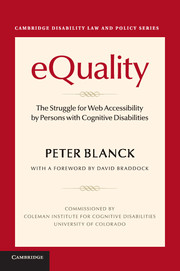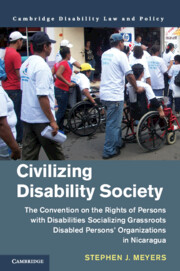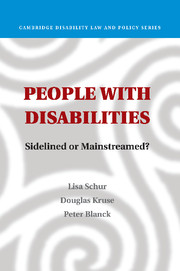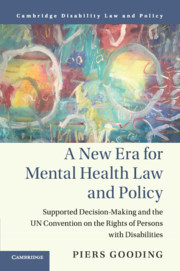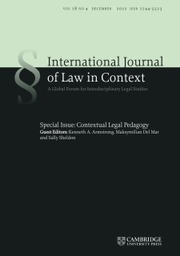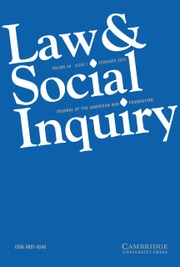eQuality
The Struggle for Web Accessibility by Persons with Cognitive Disabilities
$51.99 USD
Part of Cambridge Disability Law and Policy Series
- Author: Peter Blanck, Syracuse University, New York
- Date Published: October 2014
- availability: This ISBN is for an eBook version which is distributed on our behalf by a third party.
- format: Adobe eBook Reader
- isbn: 9781316057759
Find out more about Cambridge eBooks
$
51.99 USD
Adobe eBook Reader
Other available formats:
Hardback, Paperback
Looking for an inspection copy?
This title is not currently available on inspection
-
Never before have the civil rights of people with disabilities aligned so well with developments in information and communication technology. The center of the technology revolution is the Internet, which fosters unprecedented opportunities for engagement in democratic society. The Americans with Disabilities Act likewise is helping to ensure equal participation in society by people with disabilities. Globally, the Convention on the Rights of Persons with Disabilities further affirms that persons with disabilities are entitled to the full and equal enjoyment of fundamental personal freedoms. This book is about the lived struggle for disability rights, with a focus on Web equality for people with cognitive disabilities, such as intellectual disabilities, autism, and print-related disabilities. The principles derived from the right to the Web - freedom of speech and individual dignity - are bound to lead toward full and meaningful involvement in society for persons with cognitive and other disabilities.
Read more- Tells the story of the journey towards disability rights by focusing on the right to Web equality for people with cognitive disabilities
- Advocates for meaningful involvement in society by persons with disabilities through outlining a set of principles derived from the right to the Web, to freedom of speech and to individual dignity
Reviews & endorsements
'We must do our best to invite people with cognitive disabilities to become an integral part of our digital world. It's their right. It's society's gain. It's the right thing to do. So, hooray for eQuality! And hooray for Peter Blanck's high achievement in the publication of this pathbreaking book.' David Braddock, Professor and Director of the Coleman Institute for Cognitive Disabilities, University of Colorado
See more reviews'The twenty-fifth anniversary of the Americans with Disabilities Act is a fitting time for Professor Blanck to break wide open new territory in the civil rights struggle of persons with cognitive disabilities. eQuality is a must-read that will prove essential to scholars and practitioners concerned about Web-content equality for all people.' Michael Waterstone, Associate Dean and Professor of Law, Loyola Law School
'[A] groundbreaking achievement! In eQuality, Peter Blanck sets the stage for future advocacy of equal access to the information society.' Jutta Treviranus, Professor of Design and Director of the Inclusive Design Research Centre, OCAD University, Ontario
'Jefferson wrote that freedom has to be secured from one generation to the next. The Web allows this and future generations of persons with disabilities opportunities to open up worlds that were previously locked away. eQuality unlocks this potential and secures freedom into the twenty-first century - a virtual civic republic.' Gerard Quinn, Professor of Law and Director of the Centre for Disability Law and Policy, National University of Ireland, Galway
Customer reviews
Not yet reviewed
Be the first to review
Review was not posted due to profanity
×Product details
- Date Published: October 2014
- format: Adobe eBook Reader
- isbn: 9781316057759
- availability: This ISBN is for an eBook version which is distributed on our behalf by a third party.
Table of Contents
Foreword David Braddock
Preface
Acknowledgments
About this book
Part I. Opening:
1. Introduction: the struggle for Web equality
2. Web content equality, the ADA, and participation in society
3. Web equality and the ADA
Part II. The Advocates' Path:
4. ADA Title III and Web equality: litigation begins
5. Web equality: second-generation advocacy
6. Future Web equality advocacy
Part III. Towards Web Equality for People with Cognitive Disabilities:
7. Web content equality and cognitive disabilities
8. Web equality in action
9. Towards Web content equality
10. Equality pocket usability
Notes
References
Index.
Sorry, this resource is locked
Please register or sign in to request access. If you are having problems accessing these resources please email [email protected]
Register Sign in» Proceed
You are now leaving the Cambridge University Press website. Your eBook purchase and download will be completed by our partner www.ebooks.com. Please see the permission section of the www.ebooks.com catalogue page for details of the print & copy limits on our eBooks.
Continue ×Are you sure you want to delete your account?
This cannot be undone.
Thank you for your feedback which will help us improve our service.
If you requested a response, we will make sure to get back to you shortly.
×
